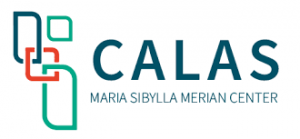CALAS/HIAS Fellowship┋Latina/o/x Cultures in the United States – Past, Present and Futures

The Maria Sibylla Merian Center for Advanced Latin American Studies in the Humanities and Social Sciences (CALAS) and the Hamburg Institute for Advanced Study (HIAS) appoint outstanding scholars, scientists, and artists from (Latin) American research institutions to pursue their research projects for four months on-site in Hamburg and two months at Bielefeld University, Germany.
This call for applications for a Guest-Professorship at the HIAS and Bielefeld University addresses interdisciplinary researchers with projects that shed light on the history, present and/or future of Latinx cultures in the United States. In times of recent anti-migration policies in the US, the formerly well-established Latinx culture is again part of narrative and material contestations. The fluid diasporic identity of Latin Americans in the US shifts back to homogenizing exclusions. The “America First” slogan reads better as “White USA First,” with severe repercussions for diasporic communities.
Latina/o artists, writers, and academics established the Borderlands following Gloria Anzaldúa or Chela Sandoval in the self-understanding of Mexican and Latinx identities living in the US. The Nepantilism, or being torn up in between cultures, became a synonym for a whole generation and an ever-growing segment of the territories on both sides of the border. Ana Castillo included her seminal Xicanisma in linguistic arts. Latinx feminism is a pivotal source for decolonial thinking. Still, latinxs are very much related to grassroots organizations and social movements, criticizing racism, exclusion, and exploitation in the US. Afro-Latin Americans became a relevant force in the Black Lives Matter Movement.
Nevertheless, latinxs are not a monolithic group with shared cultural-political values and ethics. More than 40 % of the Latino-vote was accumulated by Trump in the 2024 elections; supporting his economic but also his migration policies. To understand these electoral patterns, the reference to the exile Cuban and exile Venezuelan diaspora falls short. Rather, the lifeworlds of latinxs in the USA have diversified massively. At the same time, the shift to the right in Latin America has also found expression in latinx groups. Both major political parties have long since set out to win votes in the communities through practices of “hispandering”.
Accordingly, despite all the white America First rhetoric, a further diverse Latinoization can also be observed in the USA. The Latina/o self-determination and identity passed from being outcast and misunderstood in daily lives to underground and later mainstream culture, especially in the Southern US states. Living in fluid identities or intercultural backgrounds has become targeted as denying the existence of one true heritage. The backlash to traditional family values, white supremacy, and friend/enemy world views challenge everything Chicano/a and fluid diasporic mobilities stand for.
Researchers from all disciplines and at all stages of their careers, from postdoctoral level onwards, are welcome to apply. This call is open to candidates from all (Latin) American countries and covers a wide range of disciplines in the social sciences and humanities, especially literary and cultural studies, political sociology, history, and gender studies.
Candidates are required to be internationally recognized in their areas of specialization, to demonstrate creativity and originality in their interdisciplinary approaches, and to show a willingness and curiosity to integrate into a multidisciplinary community of researchers and artists. In addition, candidates are expected to interact with the general public through lectures and other similar activities. A solid proficiency in English, both in written and oral expression, is crucial.
The CALAS/HIAS fellowship offers a competitive stipend for a four-month stay at the Hamburg Institute for Advanced Study (HIAS) in Hamburg (February to May) and two months at the Center for InterAmerican Studies (CIAS) at Bielefeld University (June and July). This scholarship programme provides a monthly stipend for living expenses, health insurance, working materials, visa and other associated costs. For those applicants who maintain their salary in a permanent position, the scholarship can be used to fund a teaching replacement during their absence. In addition, the scholarship will cover the costs of airfare to and from Germany.
Scholarship holders are required to reside at the respective CALAS or HIAS cities throughout the duration of the scholarship and to participate in the activities and events organized by the corresponding institution.
During the stay, HIAS and Bielefeld University will provide the visiting fellow with a workplace with internet access and the university's infrastructure (library, etc.). Additionally, they will receive support in finding accommodation, completing bureaucratic formalities on-site, obtaining the required visa, etc.
CALAS/HIAS is committed to inclusive and gender parity. Applications from people with special needs are expressly welcomed. CALAS/HIAS also welcomes partners and accompanying children of scholarship holders.
Planned tasks for the CALAS/HIAS fellowship in Hamburg and Bielefeld
- Develop a research project that is related to the thematic focus of the call and its main research questions. Ideally, the project has a high degree of interdisciplinary openness.
- Publication of the results of the investigation (academic article/s).
- Teach a course in the Master program in Interamerican Studies at Bielefeld University (English or Spanish). The course should include the organization of exams and other student evaluation methods.
- Carry out at least one public academic activity (lecture, conference, colloquium) at each host institution during the stay.
- Prepare a 10-page final report on all activities carried out during the period of the fellowship.
Application:
The online application form must be filled out and include the following documents in English:
- Motivation letter stating how the project fits into the thematic focus of the call and what your expectations are (for your research stay at HIAS, and for your teaching stay at CIAS)
- Two-page curriculum vitae with a list of relevant publications and courses taught in English and/or German.
- Summary of the research project, including a timeline and work plan, with a maximum of 20 bibliographic sources (max. 2,000 words). The proposed project establishes new perspectives/ways of thinking and shows potential for connections with other disciplines.
- Tandem Partner in Hamburg: Provide a name of one or more possible academic cooperation partners from one of the HIAS member organizations (https://hias-hamburg.de/en/about-us/members/).
- Proposal for an interdisciplinary course (max. 1 page with title and brief course description) to be taught at Bielefeld University (English or German).
- Copy of most recent academic degree certificates.
Timeline:
Deadline for submission of application: June 6, 2025
Announcement of results: July 31, 2025
Start of the fellowship: February 1, 2026 (February to May in Hamburg; June and July in Bielefeld).
Further information on the CALAS/HIAS fellowships:
Prof. Dr. Olaf Kaltmeier, Bielefeld University
eMail: calas@uni-bielefeld.de

